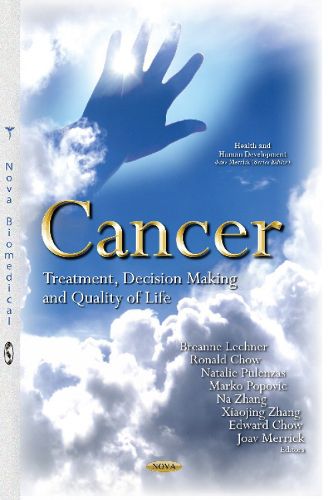Readings Newsletter
Become a Readings Member to make your shopping experience even easier.
Sign in or sign up for free!
You’re not far away from qualifying for FREE standard shipping within Australia
You’ve qualified for FREE standard shipping within Australia
The cart is loading…






In early stages of cancer, patients are often presented with treatment options and encouraged to have shared treatment decisions with their oncologists. Shared decision making becomes particularly important, as several treatment options with different possible outcomes and adverse events exist. For example, women with early breast cancer are counseled on the options of mastectomy versus lumpectomy and radiation. The same principle should also apply in late stages of cancer, where cure is usually not possible in patients with widespread metastases. In these cases, the aim of treatment should be to relieve symptoms and suffering. Improving quality of life (QOL) rather than tumor control takes priority in palliative care. QOL has also been identified as an important endpoint for new cancer drugs, as determined by the Food and Drug Administration (FDA); as such, cancer drug approval can be based on improvement of QOL. The use of patient-reported QOL instrument tools help clinicians determine if certain treatments improve QOL. The research of palliative interventions should have QOL assessment to assist clinicians, patients and their family members in shared decision making.
$9.00 standard shipping within Australia
FREE standard shipping within Australia for orders over $100.00
Express & International shipping calculated at checkout
In early stages of cancer, patients are often presented with treatment options and encouraged to have shared treatment decisions with their oncologists. Shared decision making becomes particularly important, as several treatment options with different possible outcomes and adverse events exist. For example, women with early breast cancer are counseled on the options of mastectomy versus lumpectomy and radiation. The same principle should also apply in late stages of cancer, where cure is usually not possible in patients with widespread metastases. In these cases, the aim of treatment should be to relieve symptoms and suffering. Improving quality of life (QOL) rather than tumor control takes priority in palliative care. QOL has also been identified as an important endpoint for new cancer drugs, as determined by the Food and Drug Administration (FDA); as such, cancer drug approval can be based on improvement of QOL. The use of patient-reported QOL instrument tools help clinicians determine if certain treatments improve QOL. The research of palliative interventions should have QOL assessment to assist clinicians, patients and their family members in shared decision making.